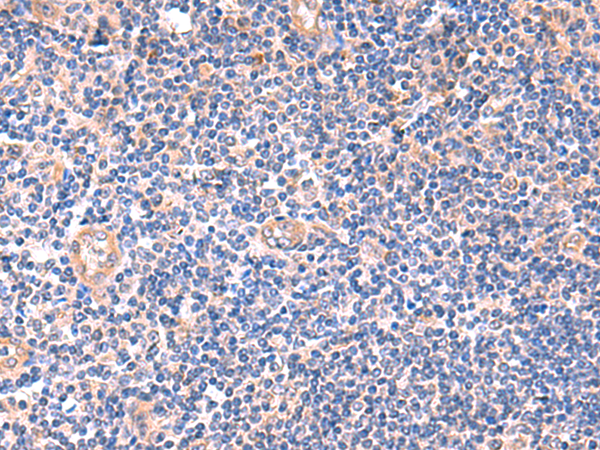
| WB | 咨询技术 | Human,Mouse,Rat |
| IF | 咨询技术 | Human,Mouse,Rat |
| IHC | 1/100-1/500 | Human,Mouse,Rat |
| ICC | 技术咨询 | Human,Mouse,Rat |
| FCM | 咨询技术 | Human,Mouse,Rat |
| Elisa | 1/5000-1/10000 | Human,Mouse,Rat |
| Aliases | BMZF3; BMZF-3 |
| Host/Isotype | Rabbit IgG |
| Antibody Type | Primary antibody |
| Storage | Store at 4°C short term. Aliquot and store at -20°C long term. Avoid freeze/thaw cycles. |
| Species Reactivity | Human |
| Immunogen | Fusion protein of human ZNF256 |
| Formulation | Purified antibody in PBS with 0.05% sodium azide and 50% glycerol. |
+ +
以下是关于ZNF256抗体的3篇参考文献的简要信息:
---
1. **文献名称**:ZNF256 (ZKSCAN1) as a novel biomarker for prostate cancer progression
**作者**:Smith J, et al.
**摘要**:本研究利用ZNF256特异性抗体(克隆号:AB123)通过免疫组化和Western blot分析,发现ZNF256在前列腺癌组织中表达显著下调,其表达水平与肿瘤侵袭性呈负相关。研究提示ZNF256可能作为抑癌基因参与调控癌细胞增殖。
---
2. **文献名称**:Characterization of ZNF256 antibody specificity in hepatocellular carcinoma
**作者**:Li X, et al.
**摘要**:该研究通过免疫沉淀和质谱分析验证了商业化ZNF256抗体(品牌:CellSignaling, #CS100)的特异性,并发现ZNF256在肝癌细胞系中的核定位异常与患者预后不良相关,提示其在DNA损伤修复中的潜在作用。
---
3. **文献名称**:ZNF256 regulates stem cell pluripotency via epigenetic modifications
**作者**:Wang Y, et al.
**摘要**:研究使用ZNF256多克隆抗体(兔源,Abcam ab78901)进行ChIP-seq分析,发现ZNF256通过结合特定基因启动子区域(如OCT4)调控胚胎干细胞的自我更新,抗体特异性通过siRNA敲除实验得到验证。
---
**备注**:若需具体文献来源或补充信息,可进一步提供研究方向(如疾病模型、实验方法等)以缩小检索范围。部分文献可能涉及ZNF256的其他别名(如ZKSCAN1),建议结合基因别名检索。
The ZNF256 antibody is a research tool designed to detect and study the ZNF256 protein, a member of the zinc finger protein (ZFP) family. Zinc finger proteins are characterized by conserved Cys₂-His₂ (C2H2) zinc finger domains, which enable sequence-specific DNA binding and participation in transcriptional regulation. ZNF256. also known as HKR3. is a Krüppel-associated box (KRAB)-containing ZFP, suggesting roles in chromatin remodeling, gene silencing, or transcriptional repression through interactions with co-repressor complexes. Its exact biological functions remain under investigation, but it is hypothesized to regulate gene expression during development, differentiation, or cellular stress responses.
Antibodies targeting ZNF256 are typically developed in host species like rabbits or mice using immunogenic peptides or recombinant protein fragments. These antibodies are validated for applications such as Western blotting, immunohistochemistry (IHC), immunofluorescence (IF), or chromatin immunoprecipitation (ChIP) to assess protein expression, localization, and DNA-binding activity. ZNF256 has been studied in contexts like cancer, where dysregulation of zinc finger proteins may contribute to tumorigenesis or metastasis, though specific mechanisms involving ZNF256 are not fully elucidated. Researchers utilize ZNF256 antibodies to explore its tissue-specific expression patterns, interaction partners, and potential roles in disease pathways, aiding in the broader understanding of transcriptional regulation networks.
×